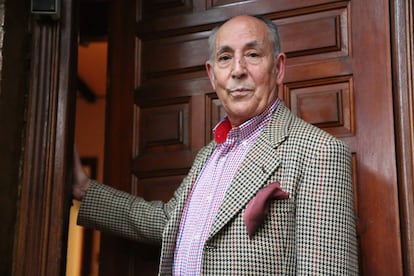Spanish Church abuse victim: “It is always there, it is always on my mind”
Leopoldo Martín, now 80, still has fresh memories of the abuse he suffered at a religious boarding school in Valladolid more than 70 years ago. His testimony is one of several making up an EL PAÍS series exposing decades of offenses committed by clergy

Leopoldo Martín, an 80-year-old Madrileño, still remembers the three pesetas that got him sent to a religious boarding school in Valladolid. It was a year that would stay with him for the rest of his life – a year of physical and sexual abuse as well as a poor diet that triggered a neurological disease known as neurolathyrism that left him with a pronounced limp.
During the mid-1940s, such was the extreme poverty of postwar Spain that Martín’s widowed mother was forced to send him to a Catholic boarding school in Madrid. “I was sent there when I was seven. And I was the one who had to make the bed for the attendant every morning,” says Martín.
One day, three pesetas (less than two euro cents) disappeared from the attendant’s bedroom. “They beat me black and blue and told me, ‘Leopoldo, if those three pesetas don’t turn up tomorrow morning, we’re going to kill you.’ So I ran away, but I was unlucky enough to get caught and, as a punishment, they sent me to a boarding school in Valladolid.”
The three pesetas were found in the pocket of a pair of trousers the attendant had sent to the cleaners
Martín recalls that the school was around 30 kilometers outside the city, and that as soon as he arrived, he was put to work on the priests’ land, fixing the roads and the tracks. “We were slaves,” he says. “They starved us. There was plenty to eat there, but they gave us their leftovers, grass, pea flour and locust beans, the same food they threw to the pigs.”
And it wasn’t long before other kinds of abuse began. “There were corridors where we were made to line up naked to bathe. The priests washed us with their hands. They touched us all over and smacked our behinds.”
Then the abuse took a more violent turn. “One day we went with a priest to a place called El Soto,” says Martín. “There, he lifted up his cassock and put a five-cent coin on his private parts and told us to get it with our mouths. Then he held us by the head and rubbed himself against us.”
The priest always chose Martín and two others. During his time in Valladolid, he was subjected three times to these episodes. The three boys finally went to a young priest to ask for help. “We took confession with him so we could tell him about it, and he said, ‘That’s impossible.’ But he went to speak to the director and in time they sent him [the abuser] away to another school in Valladolid as punishment. Nothing else happened. It was all swept under the rug,” recalls Martín.
I tried looking for archives and proof in the diocese but it was pretty complicated
Nuria Martin, daughter
When his illness got worse, Martín was admitted to the hospital in Valladolid, where he told his mother about the abuse. “She took me by the hand and we went to the school to speak to the priests. When we got there, they said to my mother, ‘If you don’t keep quiet, we’ll give you a beating.’ That is as true as the fact that I must one day die,” says Martín, who adds that when democracy arrived in Spain, he sought justice once again.
The abuse that Martín suffered that year not only affected his life, but also the lives of his wife and two children. “In a way, it is like a shadow in our own lives,” says Yolanda Martín, his oldest child. “What they did to him caused him to be a certain way, and that has perhaps meant that we, too, have been unable to have the kind of childhood that would have helped us develop as people.”
Martín has never kept quiet about the abuse that he suffered. His youngest daughter Nuria Martín, a law graduate, decided to try to bring those responsible to account in the early 1990s. “I tried looking for archives and proof in the diocese but it was pretty complicated,” she says. “I looked for information on the priests who had been there – for their names. It was spoken about with the Church, but nothing came of it.”
Nuria believes that the Church should recognize the harm that was done and ask for forgiveness, as this would at least allow the victims to find some peace for the remainder of their lives. “I hope all the Catholic Church’s filth comes out. The harm they have done…” says Martín.
After leaving hospital all those years ago, Martín went back to Madrid. He had been allowed to escape from hell, but the nightmare lingered. “It’s always there in the back of my mind,” he says, touching his hand again and again to his forehead.
He was sent back to the same boarding school he had first escaped from, and as soon as he walked through the door, he was told that the three pesetas had turned up shortly after he was sent away. They were found in the pocket of a pair of trousers the attendant had sent to the cleaners. “Those three pesetas,” he mutters. “I will always remember those three pesetas.”
English version by Heather Galloway.
